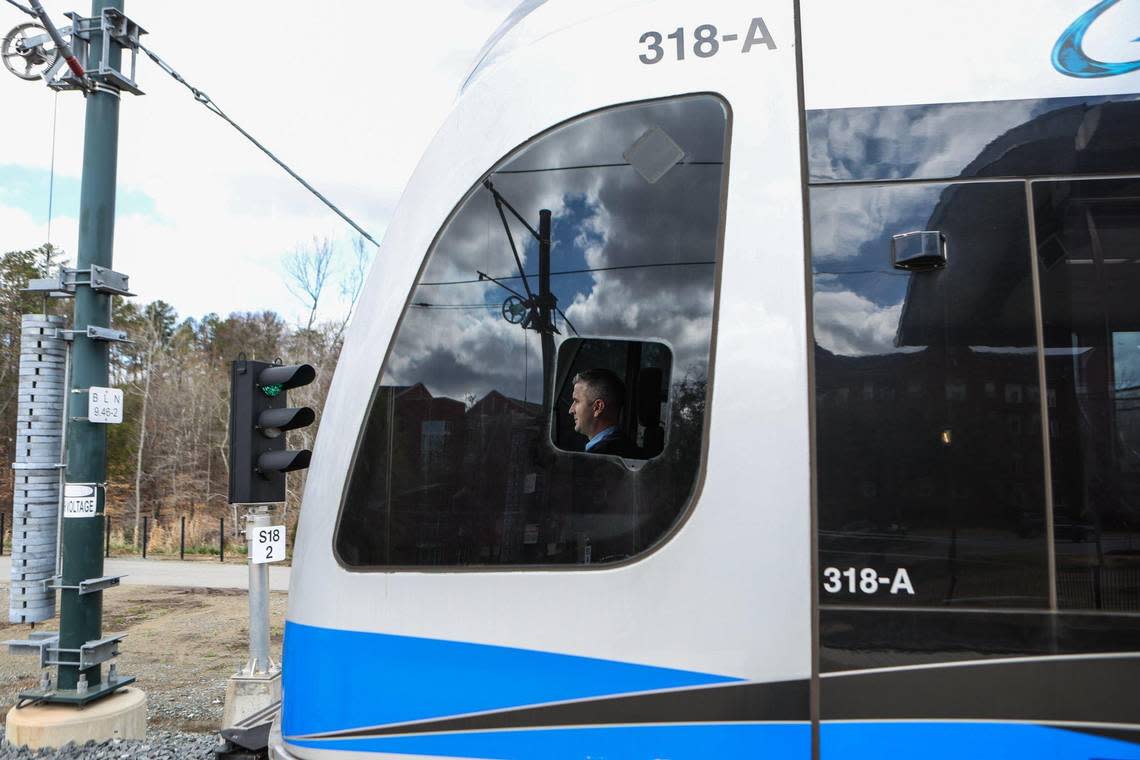Charlotte didn’t follow their vote. Now, county, mayors want changes to CATS agreement

- Oops!Something went wrong.Please try again later.
A group of Mecklenburg County leaders wants to change the way the region’s public transportation system is managed.
The city of Charlotte’s dominance over the Charlotte Area Transit System has been unfair to residents in other parts of the county whose tax dollars also help support the system, said Mecklenburg County Commissioner Leigh Altman and the mayors of Cornelius, Davidson, Huntersville, Matthews, Mint Hill and Pineville in a letter Tuesday addressed to Charlotte Mayor Vi Lyles.
Altman and the mayors want to change the region’s transportation agreement to give more power and oversight over CATS to the Metropolitan Transit Commission, a body that includes voting members from all the cities and towns in the county and non-voting members from surrounding counties.
Their push comes during a tumultuous year for CATS, including a change in leadership and train derailment that raised questions about safety.
“Over the past year, it has become increasingly clear that the parties’ original agreement did not provide the MTC sufficient authority to direct and oversee CATS’s operations or to ensure its accountability to the taxpayers,” the letter said.
What changes do county leaders want for CATS oversight?
Tuesday’s letter outlined amendments to the region’s first agreement that would:
Clarify the Metropolitan Transit Commission is the governing body of CATS and ”represents the interests of all the local governments that contribute to the system.”
Ensure the commission is involved “in the selection and evaluation” of the CATS CEO. Former CATS CEO John Lewis resigned in November. The agency is currently led by interim CEO Brent Cagle.
Revise CATS’ budget process to give the commission “early involvement” in its development before it goes to the Charlotte City Council.
Provide “mechanisms for resolving differences” between the commission and the City Council on CATS budget issues
“We believe that these are common-sense measures that will ensure greater transparency and accountability at CATS, as well as equal representation for the City, County, and Towns,” the letter says. “We also hope that these measures will help bridge the gap as we consider the formation of an independent regional transit authority.”
Altman told the Observer she currently serves on a separate committee with Lyles and other regional leaders intended to help develop a regional transit authority to better connect the growing area.
“That’s why this is so important,” she said of Tuesday’s letter. “Because it’s an opportunity to hit the reset button in a way that hopefully will give everyone the confidence and comfort to build upon what we have now for the future.”
Altman added that she and the MTC have been impressed with how Cagle has handled CATS since taking over as interim CEO.
“This is really about the governance structure for the next time we have a problem,” she said of Tuesday’s letter.
City ignored commission vote on CATS investigation, letter says
A flashpoint for the group’s request: a decision by the city of Charlotte to not follow through on a vote to hire an outside investigator to examine CATS’ management and operations. The city’s decision to not conduct such an investigation was made in part because Charlotte “believes the MTC is only an ‘advisory body’ and its votes only constitute recommendations,” the letter claims.
“We do not know when the City began to take this view, but it is not what was originally intended. The MTC was never meant to be just an ‘advisory body.’” the letter says.
The commission was intended to give everyone in the county equal representation on transit decisions, Altman and the mayors continued.
“This is only fair given the tens of millions in tax dollars the County and Towns contribute to CATS each year through the transit sales tax,” the letter says.
Altman said the city’s decision was “really something we did not agree with.”
“So, we discussed how best to ensure that the voters across Mecklenburg County who contribute to the budget for CATS can have real representation on the MTC,” she said.
The letter also notes a consultant hired by the city concluded CATS’ current structure, which splits responsibilities between the Charlotte City Council and the commission, “creates confusion and a lack of transparency.”
Charlotte’s response to letter
Lyles said in a statement the city was “reviewing the proposed amendments provided today by some members of the MTC regarding the future of public transit governance in our county.”
Lyles added she agrees on the “need to update the interlocal agreement” and “that a regional transit authority is in our future.”
“This spirit of cooperation to reach the best solutions is what is expected of us as public officials,” Lyles said
History of the Metropolitan Transit Commission
The Metropolitan Transit Commission dates back to the 1990s, CATS notes.
It was formed as part of the “Transit Governance Interlocal Agreement,” signed in 1999 by Mecklenburg County, Charlotte, Davidson, Huntersville, Cornelius, Pineville, Matthews and Mint Hill. Months before that agreement was signed, Mecklenburg County voters in 1998 approved a one-half cent sales tax to be used to finance public transportation systems.
The voting members of the commission are the mayors of Charlotte, Cornelius, Davidson, Huntersville, Matthews, Mint Hill and Pineville; the chairman of the Board of Mecklenburg County Commissioners and the regional representative from the North Carolina Board of Transportation. Altman currently serves as county board Chairman George Dunlap’s designee to the commission.
The five non-voting members representing local governments outside Mecklenburg are from the South Carolina Department of Transportation.
The commission holds monthly meetings and helps gather public input on transit planning.

